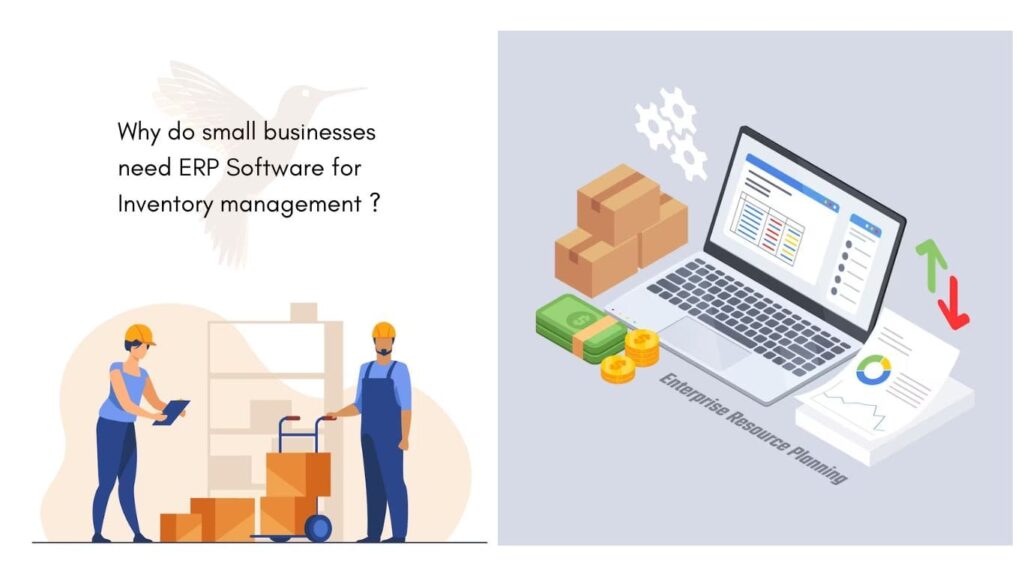ERP Software for Inventory management refers to the process of overseeing and controlling a company’s inventory, including the acquisition, storage, tracking, and distribution of goods. The goal of inventory management is to ensure that the right quantity of inventory is available at the right time to meet customer demand while minimizing holding costs and stockouts.

Small and Medium Enterprises (SMEs) often face specific challenges in inventory management.
- Limited Resources: Small businesses may have limited financial and human resources to dedicate to inventory management. They may not have the budget to invest in advanced inventory management systems or hire specialized staff to handle inventory-related tasks.
- Lack of Automation: Many small businesses still rely on manual processes for inventory management, such as spreadsheets or basic accounting software. These manual methods are prone to errors, require more time and effort, and can lead to inefficiencies in inventory tracking and control.
- Inadequate Planning and Forecasting: Small businesses may struggle with accurately forecasting customer demand and planning inventory levels accordingly. Without proper forecasting, they may face stockouts, leading to lost sales, or excessive inventory, tying up their capital.
- Inefficient Reorder Processes: Determining when to reorder inventory can be challenging for small businesses. They may lack automated reorder point systems or may not have established efficient processes for monitoring stock levels and initiating replenishment orders.
- Lack of Real-time Visibility: Small businesses often lack real-time visibility into their inventory levels and movements. This can result in stock discrepancies, difficulties in locating items, and challenges in fulfilling customer orders promptly.
- Storage and Space Limitations: Small businesses may have limited physical space for storing inventory. Managing and optimizing storage space can be a significant challenge, especially if they deal with a wide range of products or have seasonal fluctuations in demand.
- Difficulty in Data Analysis: Extracting meaningful insights from inventory data can be challenging for small businesses without the necessary tools or expertise. Analyzing inventory turnover, identifying slow-moving or obsolete items, and making data-driven decisions may be more difficult without proper analysis capabilities.
- Scaling Challenges: As small businesses grow, their inventory management processes may struggle to keep pace. Rapidly increasing inventory levels, expanding product lines, and dealing with multiple sales channels can introduce complexities that require more sophisticated inventory management solutions.
To address these challenges, small businesses can consider implementing ERP software tailored to their needs, leveraging cloud-based solutions for real-time access to inventory data, adopting barcode or RFID systems for accurate tracking, improving demand forecasting through market research and data analysis, and establishing streamlined processes for reorder management and inventory control.
When it comes to inventory management, an ERP system can provide comprehensive tools and features to streamline and optimize inventory-related activities. Here are some key functionalities that ERP systems typically offer for inventory management:
- Inventory Tracking: ERP systems provide real-time visibility into inventory levels, locations, and stock movements. They allow you to track inventory across multiple warehouses or locations, enabling better control and accuracy in managing stock.
- Demand Forecasting: ERP systems often include demand forecasting capabilities, which analyze historical data, market trends, and other factors to predict future demand. This helps in optimizing inventory levels and avoiding stock outs or overstock situations.
- Procurement and Purchase Management: ERP systems streamline the procurement process by automating purchase orders, supplier management, and order tracking. They enable efficient communication with suppliers, ensuring timely replenishment of inventory.
- Warehouse Management: ERP systems offer features for managing warehouse operations, including receiving, put-away, picking, packing, and shipping. They provide tools for optimizing warehouse layout, managing bin locations, and tracking inventory movements within the warehouse.
- Serial and Lot Tracking: For industries that deal with serialized or lot-tracked inventory, ERP systems can track and trace individual units or batches throughout the supply chain.
- Inventory Valuation: ERP systems can calculate inventory valuations using different costing methods, such as weighted average, FIFO, or LIFO. They provide accurate cost information for financial reporting and analysis.
- Inventory Optimization: With advanced analytics and reporting capabilities, ERP systems help optimize inventory levels by identifying slow-moving items, identifying surplus stock, and suggesting reorder points and quantities based on historical data and demand patterns.
- Integration with Other Business Functions: ERP systems integrate inventory management with other business functions like sales, accounting, production, and logistics. This enables seamless data flow, automates processes, and provides a holistic view of business operations.
Seeking guidance from ERP consultants can provide valuable insights and address these challenges. Contact us right away to implement the best ERP solution to effectively manage your inventory process. Freedom ERP is tailored to meet the requirements of manufacturing small businesses. Switch to Freedom ERP and see significant growth in the entire business process.



